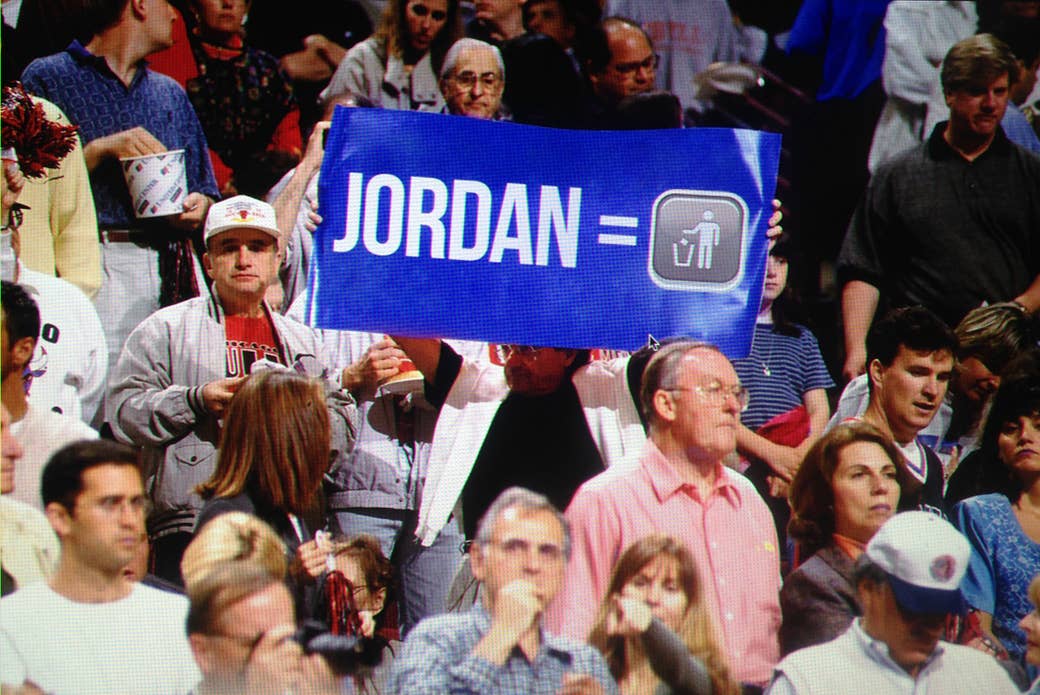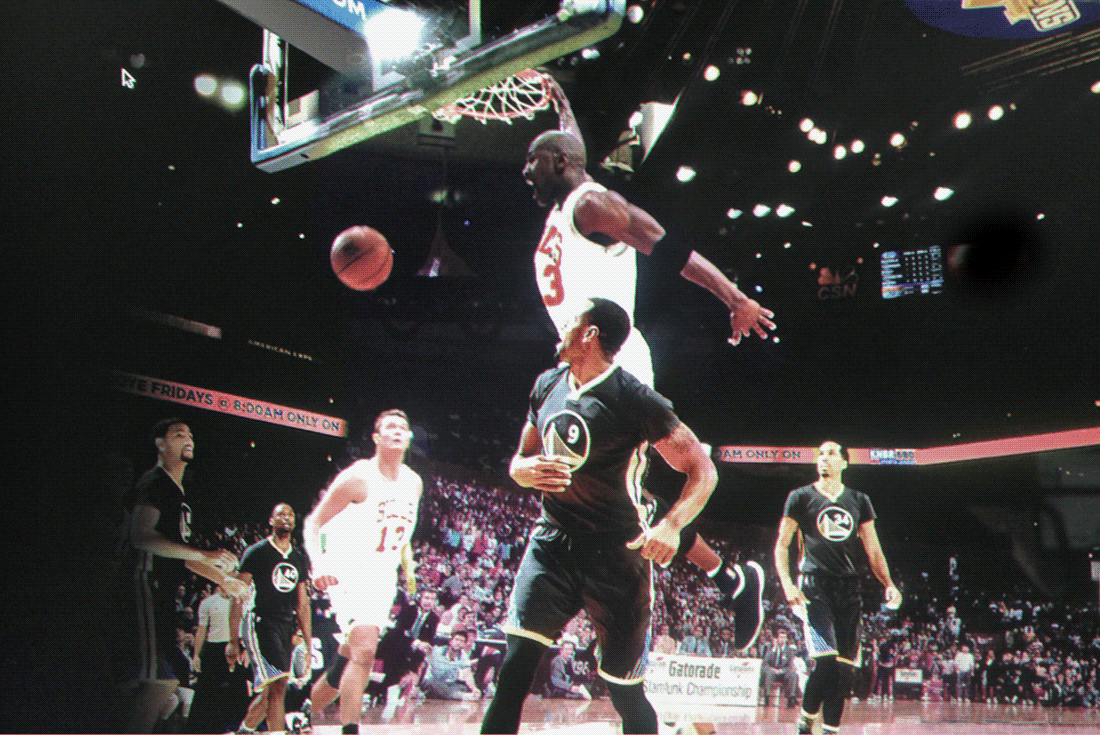
If you go by record alone, the 2015-16 Golden State Warriors are now the best team in NBA history. They finished the regular season at 73-9, one win better than the previous standard bearers, the 1995-96 Chicago Bulls. In the 59-year history of the National Basketball Association, they are the only two teams to win 70 or more games. The Bulls went on to win a championship. The Warriors hope to do the same.
Comparisons have been made between the teams all season long, and no doubt will continue to be made. Old Bulls like Scottie Pippen, Ron Harper, and Horace Grant have scoffed at the thought of the Warriors hanging with the Bulls in a seven-game series—Grant went so far to claim that ANY of the six Bulls championship teams would have swept the Warriors. Steve Kerr, who played for those Bulls and coaches these Warriors, was far more diplomatic than his ex-teammates.
It’s hard to say exactly what would have happened. Michael Jordan and Scottie Pippen were one of the best two-way tandems of all-time, and Dennis Rodman was a unique specimen in many, many ways. The Bulls played in a different era, but one imagines they could have adapted to any rules. The Warriors, meanwhile, have redefined basketball. Curry, who will undoubtedly win his second straight MVP, hit 402 threes this season, shattering the previous record by more than 100 makes. Fellow Splash Brother Klay Thompson also hit threes at a historic pace, which would have drawn more attention had he not been playing alongside Curry. And undersized center Draymond Green is something of an evolutionary Rodman, a disruptor and facilitator who can actually score. Bulls sweep? Nah.
So how would a seven-game series between the teams play out? Well, maybe a little something like this...

Game 1, Oracle Arena
The entire Bulls team underestimates the Warriors. The entire Bulls team save one person, backup point guard Steve Kerr, who has a strange feeling about them. The Bulls open like this—Ron Harper on Steph Curry, Michael Jordan on Klay Thompson, Scottie Pippen on Harrison Barnes, Dennis Rodman on Draymond Green, Luc Longley on Andrew Bogut (delighted, the two Aussies talk a lot about utes and surfing and stuff). The Warriors make just one switch, putting Draymond on Pippen and letting Barnes pick up Rodman, who has zero interest in scoring.
Realistically the Bulls go eight deep—versatile forward Toni Kukoc is essentially the sixth starter, while center Bill Wennington and Kerr get minutes off the bench. But mostly Phil Jackson rides his starters. There is rarely a time when both Jordan and Pippen are out. And few players in the history of the NBA are in better shape than the 35-year-old Rodman, who could run all 48 minutes without a break if needed. At the end of the first quarter, with the Bulls down two, Jackson answers sideline reporter Doris Burke’s query about his rotation with a koan: “What is a rotation with no movement?”
In this first game, adjustments are made on the fly. With the Warriors playing small, Longley and Wennington play less, and Rodman gets a lot of minutes at center. And rather than find a way to hide Kerr on defense, Jackson turns to third-string point guard Randy Brown to harass Curry when Harper is getting a breather. They also switch things up in the second half, with Pippen taking Curry and picking him up at three-quarters court. No open 35-footers here.
The difference in the game? Free throws. The Bulls play the Warriors physical, and pay the price. Harper fouls out, Pippen is saddled with five by the end of the third. And with the defense compromised, Curry pours in 15 of his 36 points in the fourth, as the Warriors overcome 40 from Jordan to take Game 1, 96-92.

Game 2, Oracle Arena
The second game is generally a better indication of how a series will play out than the first. The teams have seen each other up close now, in a playoff scenario, and there are fewer surprises. There are still counter moves to be sure—the Bulls have found their own “death lineup,” with Kerr replacing Harper and Kukoc replacing Longley, Rodman sliding over to center. But the focal points remain the same—Curry and Thompson, Jordan and Pippen.
Thompson is stymied again, with Pippen and Harper spelling Jordan when he needs to focus on offense. Clearly Jackson is willing to let Curry get his provided Thompson doesn’t go off. The Warriors throw lots of looks at Jordan—including 2015 Finals MVP Andre Iguodala getting his second straight impossible assignment—but accept that he’s going to get his, regardless. He does, following his Game 1 40 with 42.
But the driving force for the Bulls is Pippen, who runs the offense and posts the first triple-double of the series with 22 points, 13 assists, and 12 rebounds (Green finishes with 12, 8, and 11 for the Warriors). Also, the Bulls defense smothers without fouling, and the Warriors’s generally frenetic pace is slowed to a virtual (for them) crawl. Curry finishes with 22, and the Bulls tie the series at one apiece with a 93-81 win.

Game 3, United Center
It's Game 3 in Chicago, and it’s essentially an all-new series with the Bulls holding home court advantage in a best of five. It would be easy for the Bulls to become overconfident here, and Jackson is wholly aware of this, preaching to his team the importance of remaining in the moment, considering what is at stake. Losing home court advantage hasn’t changed anything for the Warriors. They are still loose, as evidenced by Green joking with Jimmy Goldstein courtside before tipoff.
Meanwhile, Kerr has watched Curry attempt 12 threes per game—14 in Game 1, 10 in Game 2—and wondered. Kerr led the league in three-point percentage in ‘94-95 at 52.4 percent, and followed that with 51.5 in ‘95-96 despite 64 more attempts. But he’s still topped out at seven three-point attempts in a single game, far less than that in the playoffs.
So when Kerr enters the game midway through the first quarter, he takes matters into his own hands. If he touches it, it goes up. He launches three threes, connecting on two, in his first three minutes of playing time. The Bulls extend their lead, but Jackson calls timeout, aware that his gameplan has been disrupted. Jordan angrily confronts Kerr in the huddle, but Kerr—who’s no stranger to Jordan’s fury—refuses to back down. The Bulls stay with the same lineup, Kerr launches another three, this one a 32-footer that misses, and is pulled for Brown. “What the hell is Kerr thinking?,” says play-by-play guy Mike Breen.
Kerr doesn’t play at all in the second half (final line, 2-of-4 from the floor, 2-of-4 from three, for six points in four minutes), but the damage is done. The Bulls offense can’t quite get back in sync, and Curry hits 10 of his 15 three-point attempts, going for a series-and-game-high 38. The Warriors crack 100 for the first time, winning 101-91, and regain home court.

Game 4, United Center
Jordan doesn’t talk to Kerr at all. Not in the locker room after Game 3, not on the bus, not in the locker room before Game 4. He doesn’t say much to anyone else either. Being down in a playoff series is not where he likes to be. Jackson sees this, and approves. Now it’s a series. Jordan does the powder thing on the sideline, clapping his hands loudly in Jeff Van Gundy’s face.
When the game starts, Jordan, quite simply, cannot be stopped. Not by Thompson, not by Iguodala (whose dogged defense is rewarded by a historic posterization in the second quarter), not even by Green, who tries some Jordan Rules tropes he picked up from DVDs and YouTube. After the first quarter, Burke asks Kerr what he plans on doing differently to try and stop him. He shrugs. “Pray?” That doesn’t work either. The Bulls find Jordan again and again, on the wing, in the post, and he makes the Warriors pay. On the other end, he blankets Curry, daring him to shoot. Curry has his worst game of the series, with eight turnovers and just 14 points. Jordan? He has 30. At halftime.
The second half isn’t much different—the Warriors throw all kinds of looks at Jordan, and he scores on all of them. The Bulls blow out the Warriors 110-84, and Jordan finishes with a playoff record 64. Ahmad Rashad finds Jordan afterwards. “What were you thinking out there?” “Win the game.” He walks off, Rashad following close behind. About the only positive for the Warriors is Curry gets the fourth quarter off, but not for the reasons he usually does.

Game 5, Oracle Arena
If Game 4 was a sprint, Game 5 is a slog. Things get physical from the tip—literally—as Green throws an elbow into Rodman’s ribs that goes unnoticed by the officials. Things escalate from there, and by the half, with Chicago leading 44-38, both have been assessed with technicals. It’s a good thing Joey Crawford retired before the playoffs, or else neither might be around for the second half.
The battle continues into the fourth quarter, when both are finally ejected on double technicals. This hurts the Warriors more than the Bulls, although Curry has yet again found his shooting touch. Midway through the fourth Jordan has a pedestrian (for him) 28, and Pippen is two assists short of his second triple-double of the series. Klay Thompson is still nowhere to be found.
With Green and Rodman out, Longley and Bogut both see their first extended minutes of the series, although neither is particularly involved in their respective offenses. A Curry flurry gets the Warriors within 3, at 85-82, but Jordan hits three straight baskets—the third off a Pippen steal and assist that gives him his triple-double, and the Bulls close it out after the free-throw parade, 95-84. One win to go. Jackson allows a small smile, but knows the series doesn’t actually end until a team has four wins.

Game 6, United Center
Losing was rare enough for the Warriors, but losing two games in a row? Unheard of. So the thought of them losing three in a row, in a closeout game no less, is basically inconceivable. Even against these Bulls. Even in Chicago. Even against Jordan. Of course, to do that, nearly everything has to go right.
Everything does. First, Thompson finally heats up, dropping 15 points (on five threes) in the first quarter. Iguodala comes in and makes Jordan work for every point. And then Curry goes Super Saiyan. He’s done it before of course, even in this series. But this is different. He shreds defender after defender, launching long, improbable threes before Bulls defenders can even think of getting set. Jordan, Harper, Pippen—even Rodman. No one can get in his space, let alone get in his head.
Curry has 28 at halftime, 24 of those on threes. After his seventh three of the half, a 36-footer over Kerr, he turns to the announcer’s table with a shrug and a smile.
The Chicago crowd is taken out of the game early, and never really get a chance to get back in it. The Warriors win going away, 116-90. Thompson finishes with 36, Curry with a series-high 52. Jordan has a quiet 27, and the series heads back to Oracle for the most-anticipated Game 7 in the history of basketball.

Game 7, Oracle Arena
It’s impossible to be certain, of course, but the pregame noise in Oracle—and even moreso, the noise as the home team is introduced—must be the loudest sound in an NBA building ever. Perhaps the Warriors could make some extra money exporting it to less crowd-fortunate franchises. There is a team in a borough of New York City that might be interested. The Bulls watch silently. Focused. These Warriors have never lost three in a row, but these Bulls have never lost a Finals.
Things start slow. Tentative, almost. Two teams that have faced each other six straight times seemingly feeling each other out all over again. This is chess, not checkers. Jordan finds a seam, and dunks on Bogut. Curry fires off a quick release from 30 feet over Pippen’s outstretched fingertips. Splash. Slowly, things start to heat up. Thompson hits a three, Pippen comes right back with one from straight on in transition. Whap. Curry tries to thread a pass to Green from near midcourt, Rodman picks it off and leads a streaking Jordan for a breakaway dunk. Thompson hits another three, Jordan posts up Livingston, in for Curry, and hits a baseline fadeaway. Swish. It’s 53-52 Bulls at the half.
Third quarter. This is when the Warriors usually pull away, but the Bulls won’t let them. Curry opens it up with two straight threes, but Jordan gets three the old-fashioned way, and Kukoc hits a three of his own off a Pippen dime. Longley and Bogut are relegated to the bench, the death lineups are in, and it’s hard to see either team going back to their seven-foot Aussies. The lead is swapped back and forth. Pippen strips Curry in the backcourt, Iguodala swipes an ill-advised Rodman kickout and takes it in for a dunk. The clock inexorably winds down.
Fourth quarter. Jordan goes on a one-man run, scoring nine straight points including his first three of the game. Curry responds with nine straight of his own, three threes, totaling about a hundred feet of shot. The Bulls come back to Jordan again. And again. And again. Three straight plays, three straight post-ups, three straight buckets. He has 46. Time continues to run. Draymond takes Rodman off the dribble. Pippen hits another transition three. Two-minute warning, and the scoring finally slows. Defenses tighten. Tie game. With nine seconds left and the shot clock running down, Jordan buries a 20-footer from the right side to put the Bulls up two, 96-94.
Kerr does not call time. The Warriors inbound to Curry in their own backcourt, who pushes upcourt, but not too quickly. The Bulls do not foul. Pippen shadows Curry, Harper moves to double as Curry crosses midcourt. Thirty-five feet from the basket, clock zooming in tenths, Curry stutter-steps to clear the tiniest amount of space and launches, that quick release still allowing him to get the shot off. The red light goes on with the ball nearing the top of its arc. And. And.


